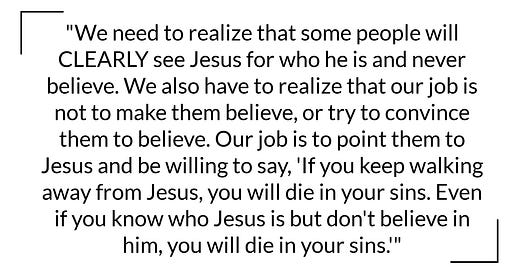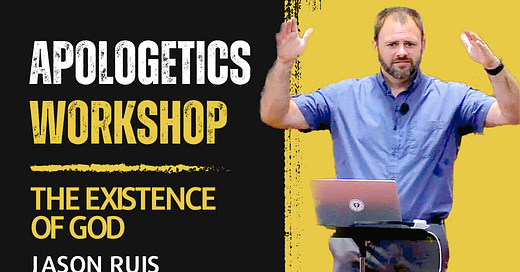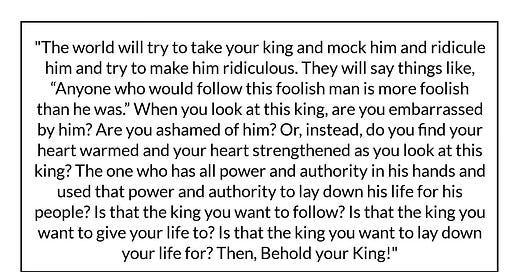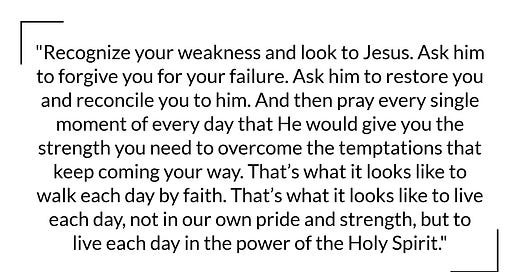
I Am He
[Read John 8:21-29]
Last week I mentioned that many people struggle with the idea and doctrine of hell. Not only non-believers, but believers also struggle with the idea. I’ve had numerous conversations with people, trying to help them understand/grasp the idea of hell. I remember one conversation I was having with a very faithful Christian. I don’t remember what I had been preaching on exactly, but it had been something about the end-times. There are many passages that speak of Jesus’ return to judge the living and the dead. And basically every passage that talks about the event also speaks of people who will refuse to repent. They will cry out to be killed, rather than repent and follow Jesus. They would rather go to hell than follow Jesus.
After the sermon, we were talking about it some more. They said something like, “I just have a hard time believing that people will be able to see God—or Jesus—and not repent.” I remember pausing for a moment, because I wasn’t sure how to respond. The reality was: I also had a hard time believing that to be true. How in the world could anyone truly and clearly see God—or see Jesus for who he is—and not give their life to him? Yet, scripture is clear that is true for many people. They won’t repent. They will willingly reject Jesus for eternity. As I was thinking through all of that—thinking about how I wanted to respond—the person said, “You know. I guess I’m still thinking of people as ‘basically good.’” That was it. And it was a rebuke to me as well. I was also assuming that people were basically good and a basically good person would definitely repent and follow Jesus if they saw him clearly.
Yet, that’s not the picture scripture gives us of humanity, is it? The Heidelberg Catechism does a great job summing up this teaching of God’s Word by saying, “I have a natural tendency to hate God and my neighbor” (HC Q&A 5). That’s our natural tendency. Everyone in this room. We don’t like to think about it or admit it, but it’s true. Our natural tendency is NOT to love and follow God. Our natural tendency is NOT to love and serve our neighbor. Rather, to hate them. If we truly believe this and understand it, we would be able to comprehend the idea that there will be people who will continue to hate God for the rest of eternity.
This is really what is going on in our passage this morning. Last week I mentioned that Jesus was getting a little sassy with the Pharisees. He doesn’t let up this week. Actually, he increases the intensity of his correction and rebuke this week. He says, “So he said to them again, “I am going away, and you will seek me, and you will die in your sin. Where I am going, you cannot come.”” (John 8:21, ESV). That’s intense. You will die in your sin. That’s what he’s telling them. Jesus isn’t beating around the bush. He isn’t playing their games any more. He’s telling them straight up. You will die in your sins. Every commentary I read this week acknowledges that Jesus is warning the Pharisees and pressing them to make a decision. Are they for Jesus or against him? Once and for all. If they continue to be against him, they will die in their sins.
There’s a line in there that really makes us uncomfortable. It’s the part that says, “you will seek me, and you will die in your sin.” (John 8:21, ESV). That’s hard for us to grasp. At first glance, it seems to give us a picture of people seeking Jesus but not being saved—still dying in their sins. Yet, that’s not exactly what Jesus is saying. We know that’s not what Jesus is saying because he clarifies himself later on in this passage. In many ways Jesus is saying to the Pharisees, “You will continue to seek me in the wrong ways” or one commentator believed, “You will continue to seek the Messiah—ME—after I’m gone and you will die in your sins.”
Two thousand years later, we see people who are still rejecting Jesus and looking for another Messiah and they are dying in their sins. Some people are looking for another Messiah—someone else to save them because they don’t want to follow Jesus. Others are trying to be their own Messiah—trying to save themselves because they are prideful and self-reliant. Either way, if you turn away from Jesus—the only Messiah—there is no other Messiah, there is no other salvation, and you will spend the rest of your life seeking, but never finding, and you will die in your sins.
This comes back to our understanding of sin. How bad is sin? Is sin just a little mistake? Is sin not a big deal? Is sin “not that bad”? Or is sin rebellion against the God who created us? Is sin a refusal to live according to reality? Is sin the path of death and destruction? Are the wages of sin death?
We know this to be true. Sure, we want to make ourselves feel better by downplaying sin and pretending it’s not a big deal, but let’s be very honest. We’ve all seen the destruction that comes from sin. We’ve all experienced the devastating results of adultery—in its variety of forms. We’ve all experienced the devastating results of lying and stealing. We’ve all even experienced the devastating results of not worshiping God the way he has told us to worship Him. We’ve watched friends and family members’ lives completely torn apart and destroyed by these things. We’ve watched them walk down the path of death and destruction. The wages of sin are death. And we must not try to change that reality when it comes to ourselves. If you keep on wandering down the path of death and destruction and refuse Jesus Christ, you will die in our sins.
Jesus gives us the solution. He goes on to say, “I told you that you would die in your sins, for unless you believe that I am he you will die in your sins.” (John 8:24, ESV). That’s the only solution to our problem. We must believe that Jesus is the Messiah—the one sent by the Father to save us from our sins—the Lamb of God who takes away the sin of the world. Unless we believe that—and really believe it—we will die in our sins. However, if we repent of our sins—turn from them—and turn to Jesus Christ in faith, believing that he is the Messiah who takes away the sin of the world, and trusting that he will cleanse us from our sin and transform our lives, then we can have this beautiful confidence that we will not die in our sins. We will be cleansed from our sins. We will be set free from our sins so that we no longer are trapped in ours sins, but transformed by the power of the Holy Spirit to walk in paths of righteousness for his name’s sake.
What’s really beautiful about this is that it is pointing back to prophecies about the Messiah—especially from the book of Isaiah. There’s this entire section in the book of Isaiah called “The Servant Songs” that goes from chapter 42-53—all talking about this Servant of the Lord who is being sent by God to redeem his people—these are clearly talking about the coming Messiah. One of those songs at the beginning says, “”You are my witnesses,” declares the LORD, “and my servant whom I have chosen, that you may know and believe me and understand that I am he. Before me no god was formed, nor shall there be any after me. I, I am the LORD, and besides me there is no savior.” (Isaiah 43:10–11, ESV). Catch the similarities in this passage? God is saying that he would send a servant—the Messiah—to be a witness that they would believe that God is the Messiah and that besides him, there is no savior. Now, Jesus is present and saying, “I am that servant. I am that Messiah. I am he. I am the Messiah who is also God. I am the only Savior. If you continue to reject me, you will die in your sin. Yet, if you believe that I am this Messiah, and trust me as the only Savior, I will deliver you from sin and death.”
What is the response? “So they said to him, “Who are you?”” (John 8:25, ESV). Another verse in this passage says, “They did not understand that he had been speaking to them about the Father.” (John 8:27, ESV). They didn’t understand. Yet, it’s more than them just not understanding. They were hostile to Jesus and mocked him. There’s this complete lack of understanding that comes from these Jewish Leaders. It doesn’t matter how clearly Jesus speaks to them about himself or who he is, they don’t understand. It doesn’t matter how strongly Jesus warns them, they don’t get it. That question is, “Why?” Why is it so hard for them to get this?
Jesus gives us that answer. He says, “You are from below; I am from above. You are of this world; I am not of this world.” (John 8:23, ESV). This is why they don’t understand when Jesus speaks. This is why they mock Jesus when he speaks. This is why they are hostile to Jesus and don’t heed any of his warnings. They are earthly—of this world. They think and speak and act of this world—rather than by the Spirit. And Jesus is from heaven and not of this world. That’s why they don’t recognize him. They are looking for an earthly Messiah, but that is not Jesus. They are looking for a Messiah that is of this world, and that is not Jesus. That’s why they can’t see him or understand him or believe him. They are BOTH looking for the wrong Messiah in the wrong places AND blinded while they do it AND—to connect this back to the beginning of the sermon, they have a natural tendency to hate God and their neighbor.
Nothing has changed from then until now. This is still true in the world today. And we need to recognize that we have a natural tendency to hate God and our neighbor AND the people we encounter on a daily basis have the same tendency. On top of that, as we are sharing our faith with our friends and neighbors and coworkers, we are speaking with people who are looking for the wrong Messiah in all the wrong places AND they are blinded by the world as they do it.
And so, what should our response be? Because, it seems like this is an impossible task, right? How in the world could anyone believe in Jesus and be saved in this condition? I want to point out how Jesus DOES NOT respond when speaking to people in this condition. He does not respond by pretending that sin is not that bad. He doesn’t try to downplay the law of God. He doesn’t act like everyone is going to heaven or that people are basically good. He isn’t ashamed about God’s Word or hell. His response to people in this condition is to press the issue. He’s not a jerk, but he’s pressing the issue, bringing them to a point of decision. He’s pointing out their search for false messiahs. He’s pointing out where they are truly putting their faith and trust. He’s pointing out the end result of pursuing these false messiahs and putting their faith and trust in the wrong places. Ultimately, he shows them that if they continue down this road—continue rejecting the Messiah—they will die in their sin.
I think we can learn from this. I want to be careful because some people can take this and run off and be jerks with the gospel—automatically condemning everyone to hell. That’s not what I’m talking about. I’m talking about a winsome pressing of the issue. Winsomely forcing people to consider the outworking of their life and beliefs. Continuing to help them see that if they continue down this path, it will not end well for them, they will die in their sins. We don’t need to be afraid or ashamed of saying that. We need to keep pressing that point and trusting that the Holy Spirit will do His work in and through our witness, and in the hearts of those God has called.
Jesus ends by saying something that paints an even starker picture. He says, “When you have lifted up the Son of Man, then you will know that I am he…” (John 8:28, ESV). Notice a few things about this. First, when Jesus talks about being lifted up, he’s talking about being lifted up on the cross. Notice that he emphasizes the word “You,” when he says this. They are the ones who will lift him up on the cross and crucify him. They will refuse to believe in him and reject him to the point that they will have him crucified. Yet, also notice that last part. When they lift him up on the cross and kill him, they will KNOW that Jesus is the Messiah. They will KNOW it but they will not BELIEVE it. Isn’t that amazing? This is what I was talking about at the beginning of the sermon. We have a hard time imagining that anyone could possibly KNOW who Jesus is but not believe in him. That’s because we have a natural tendency to hate God and our neighbor. They will see him clearly on the cross—because that’s where Christ is revealed clearly for who he is—they will know that he is the Messiah, yet, they will still refuse to believe. They will still pursue a different Messiah. They will still try to save themselves. And they will die in their sins as a result.
We will encounter people like this too. We need to realize that some people will CLEARLY see Jesus for who he is and never believe. We also have to realize that our job is not to make them believe, or try to convince them to believe. Our job is to point them to Jesus and be willing to say, "If you keep walking away from Jesus, you will die in your sins. Even if you know who Jesus is but don't believe in him, you will die in your sins."
We should also realize that the amazing thing is not that people will know Jesus and not believe in him. Rather the amazing thing is that any of us—with our natural tendency to hate God—would ever believe in Jesus and be delivered from our sins. That’s the amazing thing. And it’s important to realize that people will never believe because we did such a great job witnessing. We’re not that smart or effective. The only way that anyone comes to KNOW Jesus and BELIEVE in him is through the work of the Holy Spirit. So, you don’t need to be down and disappointed if your witness hasn’t been effective AND you better not be prideful and arrogant if your witness has been effective. Rather, you should thank God for the ways that he has used your witness to draw people to himself and save them from their sins.
Not only that, but we need to be daily reminded of this ourselves. Our natural tendency is to hate God and our neighbor. We did not believe because we were smarter than anyone or better than anyone. We did not believe because of anything we did. Left to ourselves, we would have continued to pursue false messiahs, put our trust in the wrong places, and then died in our sins. But God did something powerful in you through the Holy Spirit. The Spirit began a good work in you and opened your eyes so that when you heard the warnings of scripture you turned from your sin. The Spirit opened your eyes so that you saw Jesus as the only true Savior of the World—the Messiah—so you put your faith and trust in Him so that you would not die in your sin but would be cleansed and renewed. The Spirit opened your eyes so that you could see the way God has called you to live in the world and love it and walk in it by the strength of that same Spirit. Our response to these things should never be pride or arrogance or self-righteousness. Rather, our response should always be to fall on our knees and say, “Thank you for delivering me from my sins.”










